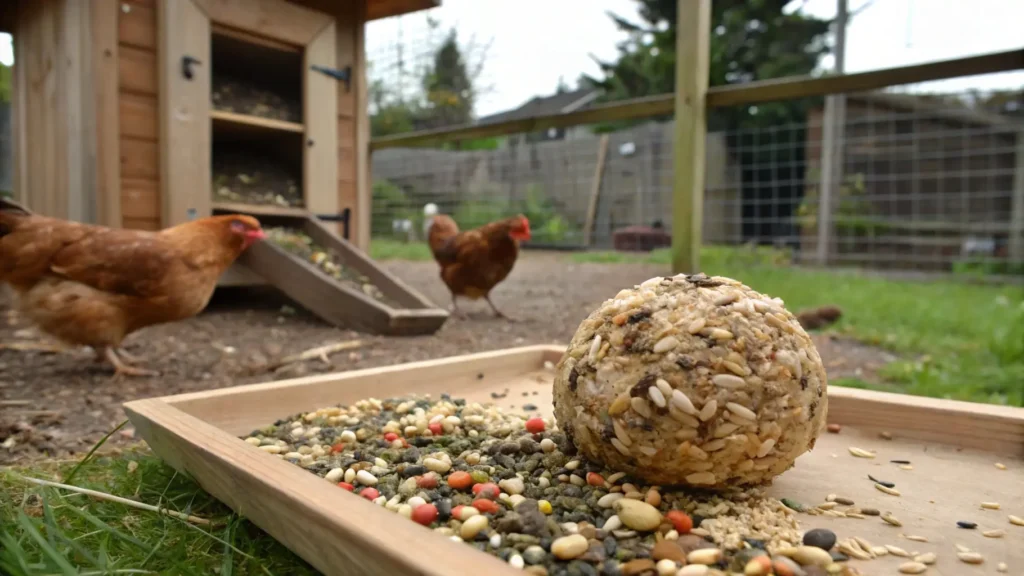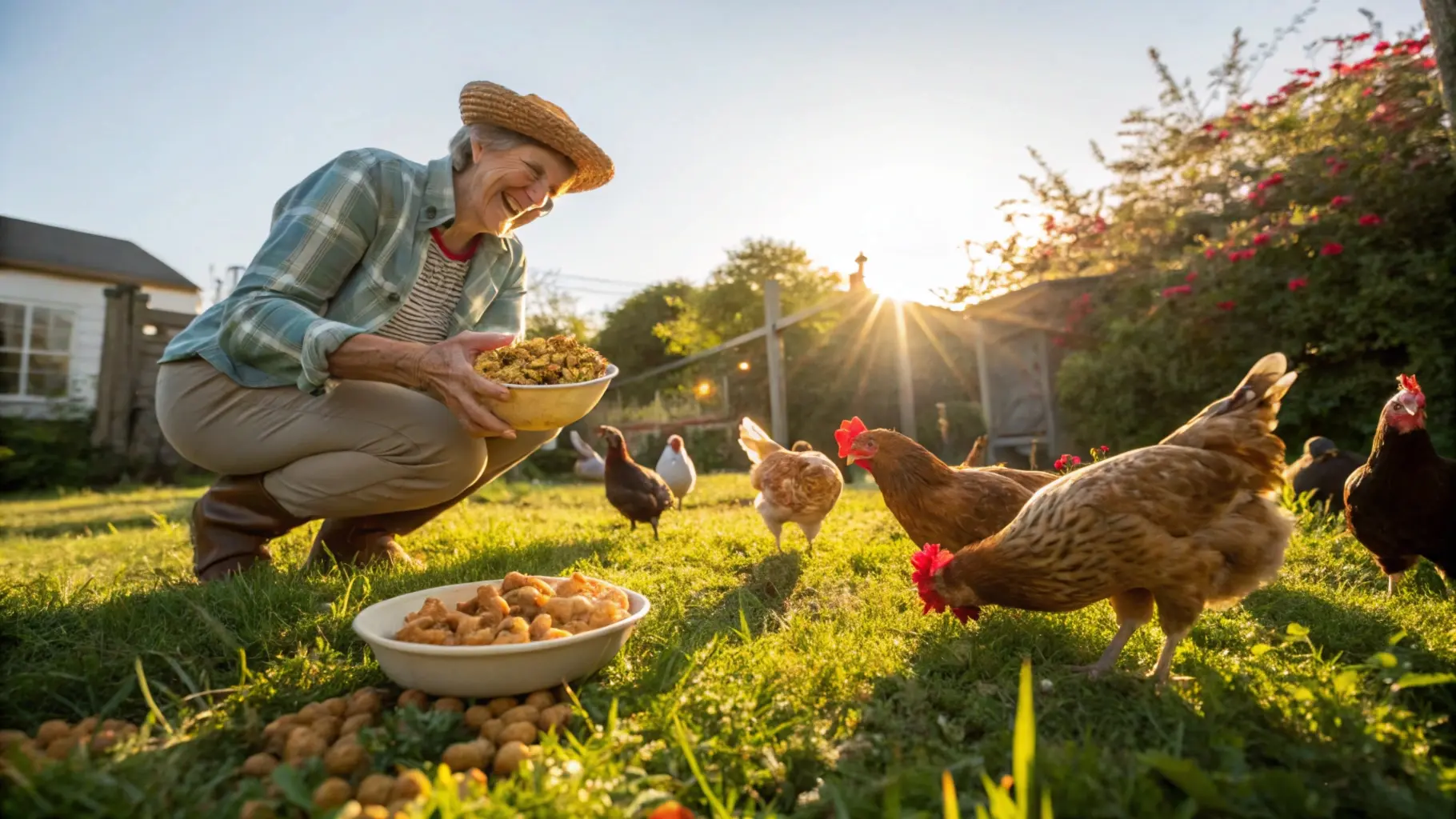When it comes to raising chickens, their diet is key to keeping them healthy and productive. Owners often wonder if they can share some of their favorite foods with their feathered friends. Is peanut butter good for chickens? It’s a common question, and the answer isn’t as straightforward as you might think. In this article, we’ll explore the nutritional value of peanut butter, its potential benefits and risks, and the best ways to serve it to chickens. Let’s dive into the details to help you make an informed decision!
Understanding Chickens’ Dietary Needs
Nutritional Basics of Chicken Diets
Chickens, like all animals, need a well-balanced diet to thrive. Their daily feed usually consists of grains, proteins, and vitamins designed to meet their nutritional needs. These components provide energy for their activities, nutrients for egg production, and support for their overall health. Typically, a formulated chicken feed serves as their main food source, offering everything they require in balanced proportions.
But chickens are not just feed-eating machines—they enjoy variety. Scraps like fresh vegetables, fruits, and even insects can supplement their diet, providing enrichment and extra nutrients. For example, greens like spinach or kale are excellent sources of vitamins, while insects like mealworms are rich in protein. Chickens also benefit from calcium-rich foods, such as crushed eggshells, which support strong eggshell formation.
While their nutritional needs are clear, owners often wonder if certain treats, such as peanut butter, can fit into their diet. This leads to the commonly asked question: is peanut butter good for chickens?
The Role of Treats in a Chicken’s Diet
Treats can be a fun way to diversify a chicken’s diet, but they should only make up a small portion of their overall food intake—no more than 10% is recommended by poultry experts. This ensures that the majority of their nutrition comes from their primary feed. Treats are best used as occasional snacks or rewards, particularly during training or social interactions with your flock.
When it comes to treats, choosing nutrient-dense options is key. For instance, scraps like watermelon rind provide hydration in the summer, while protein-rich snacks like peanuts or sunflower seeds can offer extra energy during the winter. If you’re considering peanut butter, its nutritional density makes it a tempting option, but it’s important to serve it in a way that’s safe and suitable for chickens.
Foods to Avoid When Feeding Chickens
While chickens are often seen happily pecking at a wide range of foods, not all are safe for them. Some common foods can be harmful or even toxic to their health. For example:
- Avocado pits and skins: Contain persin, a toxin that can harm chickens.
- Chocolate: Contains theobromine, which is toxic to many animals, including chickens.
- Salty or sugary snacks: Too much salt or sugar can upset their digestive system and lead to health problems.
- Raw beans: Contain a compound called phytohaemagglutinin, which is toxic to chickens.
When offering treats, it’s essential to ensure they don’t include these dangerous foods. Sticky or overly rich items, such as large globs of peanut butter, can also pose risks like choking or digestive upset. Owners often ask is peanut butter good for chickens precisely because of concerns about its texture and added ingredients.
Why Diet Diversity Matters
A varied diet isn’t just about nutrition—it also keeps chickens mentally stimulated. Pecking at new textures or exploring different flavors can reduce boredom and encourage natural behaviors, like foraging. Chickens are curious creatures, and treats like peanut butter mixed with seeds or spread on a vegetable can turn feeding time into a fun activity.
However, not all variations are beneficial. It’s crucial to strike the right balance between offering variety and ensuring that treats don’t disrupt the overall balance of their diet. For those curious about peanut butter as an option, the key lies in understanding its nutritional value and how to serve it safely, topics we’ll explore in detail in the sections ahead.
By laying a strong foundation in what chickens need nutritionally and identifying foods to avoid, you can confidently navigate the question: is peanut butter good for chickens? Let’s delve deeper into the specifics of peanut butter and its potential role in a chicken’s diet in the next section.
The Nutritional Composition of Peanut Butter
Macronutrients in Peanut Butter
Peanut butter is a nutrient-rich food that packs a punch of protein, healthy fats, and calories. A single tablespoon typically contains around 8 grams of fat, 4 grams of protein, and 90 calories. These macronutrients can provide chickens with an energy boost, particularly during colder months when they expend more energy staying warm.
For chicken owners asking, is peanut butter good for chickens, it’s essential to recognize that while the protein and fat are beneficial, the high calorie content means peanut butter should only be an occasional treat. Overfeeding calorie-dense foods can lead to obesity, which can harm your flock’s overall health.
Vitamins and Minerals That Benefit Chickens
Beyond protein and fat, peanut butter contains essential vitamins and minerals, including Vitamin E, magnesium, and potassium. Vitamin E supports healthy feathers and immune function, while magnesium plays a role in muscle health. Potassium helps with maintaining proper fluid balance and nerve function.
Although these nutrients can complement a chicken’s diet, peanut butter doesn’t provide everything a chicken needs. Its high sodium levels in some brands may even negate its benefits. For this reason, it’s always best to choose natural, unsalted peanut butter to avoid introducing harmful additives.
Is Peanut Butter Safe for Chickens?
Potential Risks of Feeding Peanut Butter to Chickens
While peanut butter can be safe in small quantities, there are risks to consider. The sticky texture can make it difficult for chickens to swallow, potentially causing choking if given in large globs. Additionally, peanut butter that contains added sugars, salts, or artificial ingredients can upset a chicken’s digestive system or lead to long-term health issues.
Another concern is the high fat content. Chickens don’t require large amounts of fat in their diets, and too much can lead to weight gain or fatty liver disease. If you’re wondering, is peanut butter good for chickens, the answer depends largely on how it’s prepared and served.
How to Serve Peanut Butter Safely
To safely include peanut butter in your chicken’s diet, it’s important to dilute or mix it with other ingredients. For example, you can blend peanut butter with grains, seeds, or even oatmeal to create a less sticky, easier-to-eat treat. Spreading a thin layer of peanut butter on whole-grain bread or incorporating it into homemade chicken snacks ensures it’s both safe and enjoyable.
By taking these precautions, you can minimize the risks and make peanut butter a fun, occasional treat for your flock. In the next section, we’ll discuss how peanut butter can actually benefit chickens when given in moderation and as part of a balanced diet.
Benefits of Peanut Butter for Chickens
Protein as a Nutritional Boost
Peanut butter is a rich source of protein, which is essential for chickens’ muscle development and egg production. During molting, when chickens shed and regrow feathers, their protein needs increase significantly. A small amount of peanut butter can act as a supplemental protein source to aid in feather regrowth. If you’re wondering is peanut butter good for chickens, this benefit makes it a handy treat, especially during demanding periods in their life cycle.
However, moderation is key. Too much protein, especially from calorie-dense sources like peanut butter, can lead to imbalances in their diet. Always ensure peanut butter complements their primary feed, not replaces it.
Improved Feather Health from Healthy Fats
The healthy fats in peanut butter can also support shiny, strong feathers. Fats play an important role in maintaining the integrity of feathers, especially in harsh weather conditions. In winter months, when chickens use extra energy to stay warm, the added calories and fats from peanut butter can provide a helpful boost.
That said, avoid overloading their diet with high-fat foods. Too much fat can lead to obesity, reducing a chicken’s mobility and overall health. Peanut butter should be seen as an occasional treat rather than a daily staple.
How to Incorporate Peanut Butter into Chickens’ Diet
Homemade Peanut Butter Treats

Making homemade treats is one of the safest ways to include peanut butter in your chickens’ diet. For example, you can mix peanut butter with oats, cracked corn, or birdseed to create small, manageable snacks. Shape the mixture into bite-sized balls or spread it thinly on whole-grain bread for a nutritious, easy-to-eat treat.
You can also bake peanut butter into homemade suet cakes, adding a variety of grains and seeds for texture. These cakes are particularly beneficial during colder months when chickens need extra energy to stay warm.
Peanut Butter as Part of a Balanced Diet
Peanut butter should always complement—not replace—a chicken’s regular feed. A thin layer of peanut butter spread on a piece of vegetable or fruit can add variety and fun to their diet. Apples, celery, or carrots are great options that provide both nutrition and enrichment.
For chicken owners curious about is peanut butter good for chickens, the key is balance. By serving peanut butter in small, controlled amounts, you can provide your flock with an occasional treat without disrupting their dietary needs.
Frequently Asked Questions
Can Peanut Butter Be Harmful in Large Quantities?
Yes, peanut butter can be harmful to chickens if overfed. While it’s a nutritious treat, the high fat and calorie content can lead to obesity and other health problems. For chickens that aren’t very active, even small amounts of peanut butter can contribute to weight gain. Additionally, the sticky texture of peanut butter can pose a choking hazard if it’s not mixed with other foods or served in manageable portions.
For those still asking, is peanut butter good for chickens, the answer lies in moderation. A little peanut butter mixed with grains or seeds is safe, but it shouldn’t become a regular part of their diet.
What Ingredients Should Be Avoided in Peanut Butter?
Not all peanut butter is created equal. Some brands contain added sugar, salt, or artificial preservatives, which can be harmful to chickens. Excess sodium can disrupt their electrolyte balance, while artificial ingredients may irritate their digestive system.
Always choose natural, unsalted peanut butter with no additives to ensure it’s safe for your flock. If you’re unsure about a brand, check the ingredient list—it should ideally contain only peanuts.
Are There Better Alternatives to Peanut Butter?
While peanut butter has its benefits, there are other protein-rich treats that chickens may enjoy more. Scrambled eggs, mealworms, and sunflower seeds are excellent options that provide similar nutritional benefits without the risks of stickiness or additives. However, if your chickens enjoy peanut butter, using it occasionally as part of a balanced treat is perfectly fine.
Conclusion and Final Thoughts
Should You Feed Peanut Butter to Chickens?
The question is peanut butter good for chickens doesn’t have a simple yes or no answer—it depends on how it’s served and in what quantity. Peanut butter can be a nutritious and enjoyable treat for chickens, providing protein and healthy fats. However, it’s essential to offer it sparingly and mix it with other foods to ensure safety.
Final Recommendations for Chicken Owners
For chicken owners eager to try peanut butter, start with small amounts mixed into grains or fruits to test how your flock reacts. Always choose natural peanut butter without added salt or sugar, and avoid feeding sticky globs that could cause choking.
Ultimately, variety is key to a healthy diet. While peanut butter can be a fun addition, ensure your chickens’ primary nutrition comes from high-quality feed and fresh produce. With the right approach, peanut butter can be an occasional treat that both you and your chickens enjoy.

